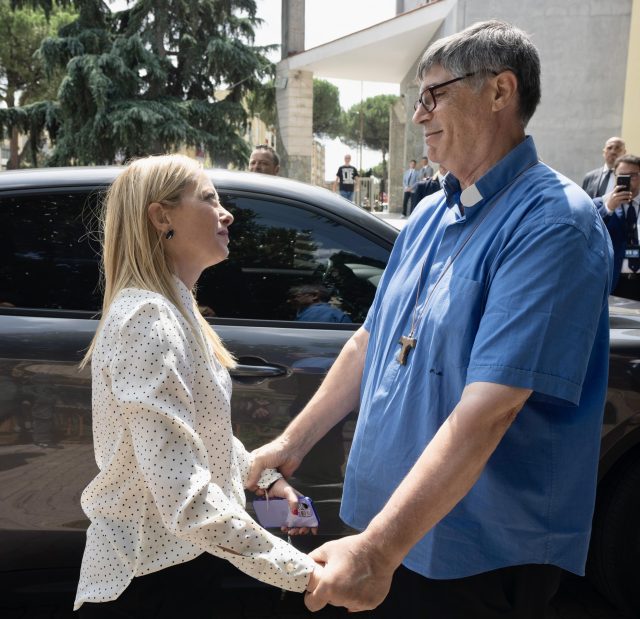
It was the end of August last year and Italy returning from summer holidays was brought back to reality by a report that would shake everyone’s spirits: two girls aged 10 and 12 had for some time been subjected to violence by minors and adults in a place that we all know today, but which at the time was known only to those who lived there, to those who had made it a base for crime and to a priest who did not want to give up: Caivano.
Caivano, or more precisely Parco Verde di Caivano, is a small municipality in the metropolitan city of Naples, made up of council houses, which, following the earthquake of the 1980s, took in numerous families, catapulted into what was to become a veritable ghetto in the hands of the underworld.
In the plans of those who had built it, Caivano was supposed to be a happy island for the displaced to start again, with a sports centre, a municipal park and a series of projects that were never realised or abandoned.
Over the years, decay has meant that illegal houses have sprung up there, many flats have been occupied and crime has become the master of the municipality without anyone trying to stop it, much easier for the local institutions of the time to turn their gaze elsewhere. After all, the proliferation of crime in a confined area was bearable collateral damage.
Years later, post covid Italy decided to change history and hand over the reins of the country to the person who had always believed in the rebirth of a nation: Giorgia Meloni.
And that gash that opened in the mists of Caivano a few months before the Meloni government took office did not go unnoticed.
But, as mentioned, there is another positive protagonist in this story, a priest, Don Patriciello.
Maurizio Patriciello is a priest ‘of the streets’, the real, authentic kind, who becomes the parish priest of Caivano and discovers upon his arrival that he is in a place where there are 13 drug-dealing squares for a business of 100 million euro a year, where waste of all kinds is burned and where the state is replaced by the camorra.
He does not give up and for this he suffers intimidation of all kinds, culminating in an attack on his parish in March 2022. But he does not stop.
And so we arrive at the summer of 2023, that end of August already recounted, which will be the turning point for him, for Caivano and probably for that Italy that needs to believe.
He himself recounts that end of summer, with the chronicles recounting the degradation and the institutions that continue to be absent… until October.
Because once Giorgia Meloni took office, she received a text message from Don Patriciello and called him.
Eight days later, the new premier is there, by his side, in that small municipality forgotten by all, and she makes a promise: Caivano will no longer be abandoned but will become a model.
And finally, the police arrived in Caivano, the park was cleaned up, the occupants were counted and the delinquents stopped, and the project for the total redevelopment of the area began.
Yesterday, 28 May, the former Delphinia sports centre in Caivano in the presence of Council President Giorgia Meloni was reopened. The structure, the same one that in a state of neglect was the scene of the violence against the two girls, has been completely renovated and rehabilitated, and will finally be able to be frequented by the area’s youngsters.
More than 50 thousand square metres, facilities for a wide variety of sports disciplines. In addition to the swimming pool, there are football, tennis and padel courts. Next to it is a public park that has been cleared and restored by the Carabinieri of the Forestry Department. The new sports facility will be managed by the Golden Flames of the State Police.
This was unthinkable just a few months ago, so much so that Don Patriciello himself, during his speech at the inauguration from the stage, addressing the Prime Minister sitting in the front row and calling her ‘tu’ in the Neapolitan language, said to her: ‘Giorgia “O vveco e nun ”o crero’, and then translated: ‘Giorgia what I see I find hard to believe’.
And inaugurating the structure Giorgia Meloni said ‘this is one of the days in which the toil, the problems, the sacrifices, the anxiety take on meaning in this mission that we carry out. Caivano is one of my main bets, perhaps I was not prepared for the emotion I felt this morning, for the impact of the difference. The message is that the State can make a difference, can keep its commitments, here the State and the institutions behaved as they should always behave. They realised a problem, thought of a response, made an announcement and the announcement did not fall on deaf ears, it became a fact. And this means giving hope in an area where very often the institutions have thought that there could be no hope. It is a very powerful message’.
A powerful message, a model and a hope for all Italians who have too often been abandoned by institutions. Today the state is there and our Prime Minister is ready to challenge those who do not believe that things can change.
Finally.
Femo



 Subscribe
Subscribe